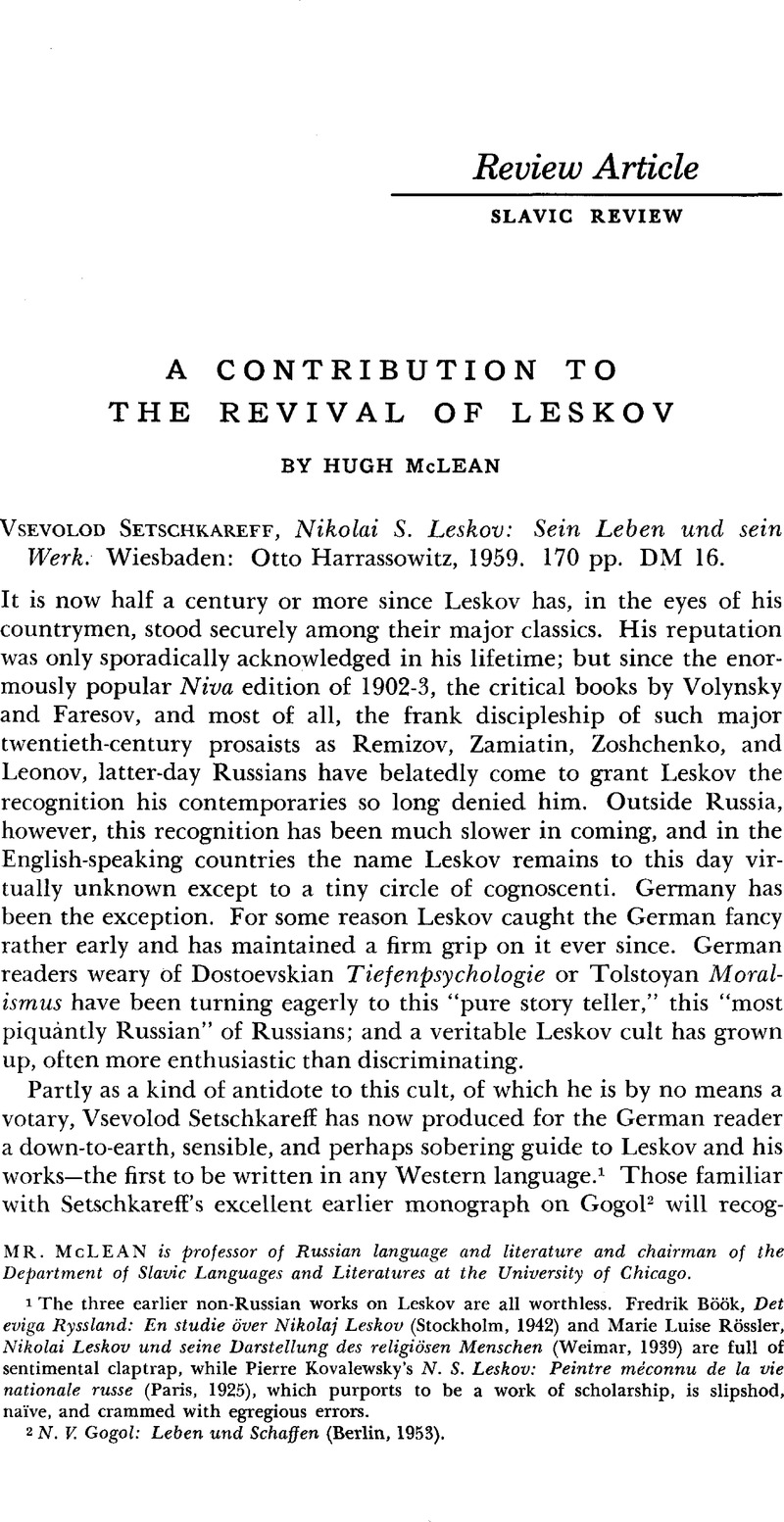No CrossRef data available.
Published online by Cambridge University Press: 27 January 2017

1 The three earlier non-Russian works on Leskov are all worthless. Böök, Fredrik, Vet eviga Ryssland: En studie över Nikolaj Leskov (Stockholm, 1942)Google Scholar and Rössler, Marie Luise, Nikolai Leskov und seine Darstellung des religiosen Menschen (Weimar, 1939)Google Scholar are full of sentimental claptrap, while Kovalewsky's, Pierre N. S. Leskov: Peintre meconnu de la vie nationale russe (Paris, 1925)Google Scholar, which purports to be a work of scholarship, is slipshod, naive, and crammed with egregious errors.
2 N. V. Gogol: Leben und Schaffen (Berlin, 1953).
3
![]() (Moscow, 1954).
(Moscow, 1954).
4 One example: In documenting Leskov's annoyance at Katkov's irresponsible editing o£ Zakhudalyi rod (1874), Setschkareff (p. 25) cites (from a tertiary source) a letter to “N. Protopopov” in which Leskov quotes the famous remark made about him by Katkov to an editorial assistant named “Voskoboev“: “This man is not ours” (“Etot chelovek ne nash“). Setschkareff seems to imply that the letter was written about the time the break with Katkov occurred; at any rate, he gives no date. In fact, the letter was written on December 23, 1891; it was addressed not to “N.” but to Mikhail Alekseevich Protopopov; and the name of Katkov's assistant was Voskoboinikov, not Voskoboev. Minutiae, perhaps, but annoying. In general, it is a pity that Setchkareff had apparently finished work on his book before the publication of the recent Soviet edition of Leskov was completed (Codpauue commeHuii II vols., Moscow, 1956-58). The accuracy and completeness of his work would have been improved if he could have made use particularly of the letters in Vols. X and XI and the critical apparatus throughout the edition. On the other hand, the letter to Protopopov had been first published in 1940, in an edition which Setschkareff cites in his bibliographv; but for some reason he prefers to quote from the collection ![]() (Leningrad, 1955), which gives only excerpts.
(Leningrad, 1955), which gives only excerpts.
5 Brigitte Macher, “Nikolai Leskov's Verhaltnis zur Orthodoxie” (Marburg, 1952), and William B. Edgerton, “Nikolaj Leskov: The Intellectual Development of a Literary Nonconformist“ (Columbia University, 1954).
6 E.g., Leskov's preface to ![]() (1886) is cited (p. 162) not from the original, but from the pedestrian critical work by Boris Drugov
(1886) is cited (p. 162) not from the original, but from the pedestrian critical work by Boris Drugov ![]() Moscow, 1957). In so doing Setschkareff fails to separate the original correctly and ascribes to Leskov words that belong only to Drugov.
Moscow, 1957). In so doing Setschkareff fails to separate the original correctly and ascribes to Leskov words that belong only to Drugov.
7 “Leskov and Tolstoy: Two Literary Heretics,” American Slavic and East EuropeanReview, Vol. XII, No. 4 (Dec, 1953).